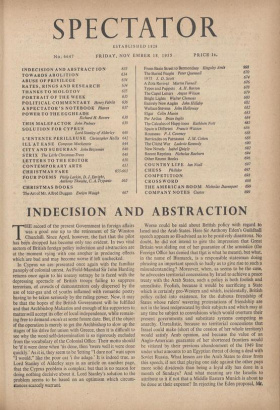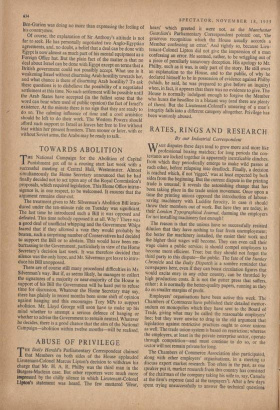INDECISION AND ABSTRACTION
THE record of the present Government in foreign affairs was a good one up to the retirement of Sir Winston Churchill. Since April, however, the fact that the pilot has ben dropped has become only too evident. In two vital sectors of British ,foreign policy indecision and abstraction are at the 'moment vying with one another in producing effects which, are bad and may become worse if left unchecked.
In Cyprus we are presented once again with the familiar panoply of colonial unrest. As Field-Marshal Sir John Harding returns once again to his uneasy satrapy he is faced with the depressing spectacle of British troops failing to suppress terrorism, of crowds of demonstrators only dispersed by the use of tear-gas and of youths inflamed with romantic poetry having:to be taken seriously by the ruling power. Now, it may be that the hopes of the British Government will be fulfilled and that Archbishop Makarios and enough of his supporters to matteriwill accept its offer of local independence, while remain- ing free to demand enosis at some future date. But, if the object of the operation is merely to get the Archbishop to slow up the stages of his drive for union with Greece, then it is difficult to see why the word self-determination is so rigorously excluded from the vocabulary of the Colonial Office. Their motto should be 'if it were done when 'tis done, then 'Mere well it were done quickly.' As it is, they seem to be 'letting "I dare not" wait upon "I would," like the poor cat 'i the adage.' It is indeed true, as Lord Stanley of Alderley says in an article on another page, that the Cyprus problem is complex; but that is no reason for doing nothing decisive about it. Lord Stanley's solution to the problem seems to be based on an optimism which circum- stances scarcely warrant. Worse could be said about British policy with regard to Israel and the Arab States. Here Sir Anthony Eden's Guildhall speech appears so ill-advised as to be positively disastrous. No doubt, he did not intend to give the impression that Great Britain was sliding out of her guarantee of the armistice (the Foreign Office has denied that that is what he meant), but what, in the name of Bismarck, is a responsible statesman doing phrasing an important speech so badly as to give rise to such a misunderstanding? Moreover, when, as seems to be the case, he advocates territorial concessions by Israel to achieve a peace treaty with the Arab States, such a policy is both foolish and unrealistic. Foolish, because it would be sacrificing a State which is certainly pro-Western and which, incidentally, British policy called into existence, for the dubious friendship of States whose rulers' wavering protestations of friendship are not in the least reciprocated by their subjects and which may at any time be subject to convulsions which would overturn their present governments and substitute systems competing in anarchy. Unrealistic, because no territorial concessions that Israel could make (short of the cession of her whole territory) would satisfy Arab opinion, and because the value of an Anglo-American guarantee of her shortened frontiers would be vitiated by their previous abandonment of the 1949 line under what amounts to an Egyptian threat of doing a deal with Soviet Russia. What lesson are the Arab States to draw from this speech, if not that playing one side against the other pays more solid dividends than being a loyal ally has done in a month of Sundays? And what meaning are the Israelis to attribute to it if not that a Middle Eastern Munich is about to be done at their expense? In rejecting the Eden proposal, Mr. Ben-Gurion was doing no more than expressing the feeling of his countrymen.
Of course, the explanation of Sir Anthony's attitude is not far to seek. He has personally negotiated two Anglo-Egyptian agreements, and, no doubt, a belief that a deal can be done with Egypt is now almost as much part of his mental equipment as a Foreign Office hat. But the plain fact of the matter is that no deal about Israel can be done with Egypt except on terms that a British government could not possibly accept. What use is it weakening Israel without disarming Arab hostility towards her, and what chance is there of disarming Arab hostility? To ask these questions is to disbelieve the possibility of a negotiated settlement at this time. No such settlement will be possible until the Arab States have accepted (in the fullest sense that the word can bear when used of public opinion) the fact of Israel's existence. At the minute there is no sign that they are ready to do so. The calming influence a time and a cool armistice should be left to do their work. The Western Powers should afford such support to Israel as leaves her free to live without fear within her present frontiers. Then sooner or later, with or without Soviet arms, the Arabs may be ready to talk.











































































 Previous page
Previous page